Unconventional #12: Ted Cruz’s last crusade, a Trump-Gingrich ticket (and more!)
1. Ted Cruz’s last crusade
Texas Sen. Ted Cruz suspended his bid for the Republican presidential nomination last Tuesday after a crippling loss to Donald Trump in Indiana.
But that doesn’t mean he and his allies are giving up.
In the span of a single 16-hour period early this week, Cruz’s top supporters revealed that they are preparing to wage war in Cleveland over the GOP platform, while Cruz himself pointedly refused to rule out the prospect of resurrecting his campaign against Trump.
It’s the latest sign that conservatives aren’t embracing the GOP’s presumptive nominee — and that this summer’s Republican convention, where other conservative groups are already girding for battle over the platform , is likely to be anything but boring.
Call it Cruz’s last crusade (at least until he runs for president again in 2020).
Speaking to radio host Glenn Beck Tuesday , Cruz said that he dropped out after Indiana because he “didn’t see a viable path to victory.”
But then he added an intriguing coda.
“If that changes,” Cruz continued, “we will certainly respond accordingly.”
In a gaggle of reporters on Capitol Hill Tuesday afternoon, Cruz repeated his line about not having a viable path to victory before again raising the possibility that he could reenter the race in the weeks or months ahead.
“Of course if that changed, we would reconsider things,” Cruz said. “If circumstances change, we will always assess changed circumstances.”
The Texan also declined to endorse Trump.
“This is a choice every voter is going to have to make,” Cruz told Beck. “It is not a choice that we as voters have to make today.”
Meanwhile, a group of top Cruz supporters organized a conference call Monday night urging disappointed Cruz delegates — who have to pay their own way to the convention — not to make other plans for July 18 to 21. According to Politico, the goal was to deliver “a rallying cry to Cruz’s supporters about the importance of showing up in Cleveland and not ceding control of their slots on the party’s platform and rules committees.”
To find out more — about Cruz’s curious remarks as well as the plan for Cleveland — Unconventional spoke to former Virginia Attorney General Ken Cuccinelli, the archconservative who led Monday’s call after serving as Cruz’s top delegate hunter during the campaign.
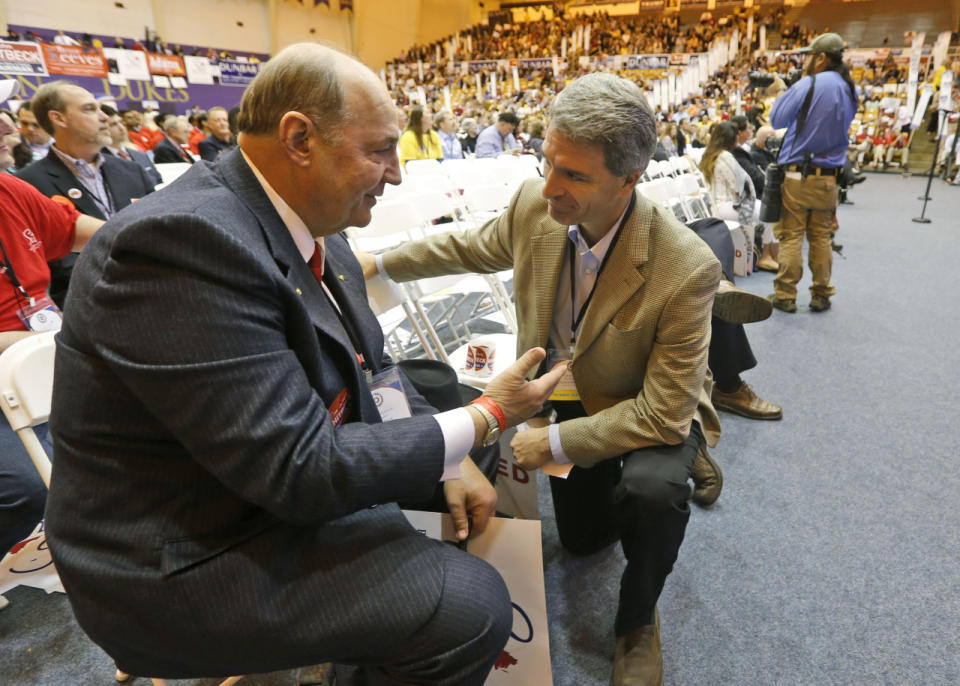
Former Virginia Attorney General Ken Cuccinelli, right, talks with convention delegate Kenny Golden during the Virginia State Republican Convention in Harrisonburg, Va., on April 30, 2016. (Photo: Steve Helber/AP)
Unconventional: Why reach out to Cruz’s delegates now?
Ken Cuccinelli : After seeing the discouragement of some of our folks, we wanted to encourage them to stay engaged. I kept getting calls, emails, texts: “What can we do?”
The Trump people are insisting he is going to be a conservative. Maybe they’re right. My response is simply that actions speak louder than words. He’s now going to be in a five-month war with Hillary. We’ll see if he takes and holds positions under fire for long periods of time. That’s the test.
So what did you tell Cruz’s delegates?
The first thing I talked about on our call Monday night was, “Let me be very clear about what this call is not. We are not trying to undo the presumptive nomination of Donald Trump. Period. End of discussion. But there are other things to do on rules and on platform.”
Your team worked aggressively to ensure that Cruz’s delegates were elected at the local and state levels so they would be in place to support the senator during multiple rounds of balloting in Cleveland. Now some of those delegates can get on the rules committee and the platform committee, where they aren’t bound by anything but their own consciences. Do you think they could have a big impact?
Right now, the largest bloc of voters elected to the convention — by loyalty — are Cruz delegates. By double. We have twice as many as Trump.
What are the numbers?
At this point, those numbers are about 500 for Cruz versus 250 for Trump.
Let’s talk about the platform. What will Cruz’s delegates be fighting for?
The platform has been an area of interest for conservatives for a long time and that has not abated. It is an expression of what, on an ideal day, a Republican is supposed to be. It sets the bar.
Some issues don’t change, like the protection of life. We have to have the votes to keep the abortion plank the same. But there are new ones too. If we’re going to deal with the silliness on [transgender access to] bathrooms — and it’s ridiculous that we need to do it, but we obviously do — then we will do that.
We want to express what we believe and make sure it’s firmly rooted in the platform.
Since clinching the nomination, Trump has already departed from conservative orthodoxy on taxes and the minimum wage. Is he a threat to the platform?
I don’t want to overplay that. That remains to be seen. I’m not sure he’ll care at all.
What about the rules? Will the Cruz folks be battling it out with the Trump folks on the rules committee?
You seem to be inherently casting this as Cruz people versus Trump people. But when it comes to something like the rules, this is very much the establishment versus the grassroots, and I think you would find an awful lot of overlap between Cruz and Trump delegates in that regard.
Look at 2012 and how it infuriated a lot of us, myself included, when the additional oppression was applied by the establishment folks with Rule 40(b) [which decreed that a candidate must win a majority of delegates in eight states or territories to be eligible for the nomination].
It was a great irony that the two candidates who got over the 40(b) threshold this year were the two most antiestablishment candidates in a field of 17: Trump and Cruz. That was certainly not the establishment’s intent when that rule was put in place.
So what’s an example of a rule that the grassroots might fight the establishment over?
One example would be to forbid the RNC from amending the rules in between conventions.
On Tuesday, Cruz seemed to open the door to resurrecting his campaign “if circumstances change.” Why did he say that? What circumstances would have to change for Cruz to reenter the race?
Probably the death of Donald Trump. [Laughs] Look, Ted is a lawyer. He is a literalist in many respects. That’s the kind of constitutionalist he is. And I’m sure there is some theory — like if Trump did something so unbelievable that even his own people threw him overboard. Then in that crazy, wild circumstance, Ted wouldn’t rule it out.
It sounds like Cleveland might be exciting after all.
Yes, I hope so … since I’m going. [Laughs] Nobody likes to be bored.
_____
2. Inside Clinton’s two-front war against Sanders and Trump
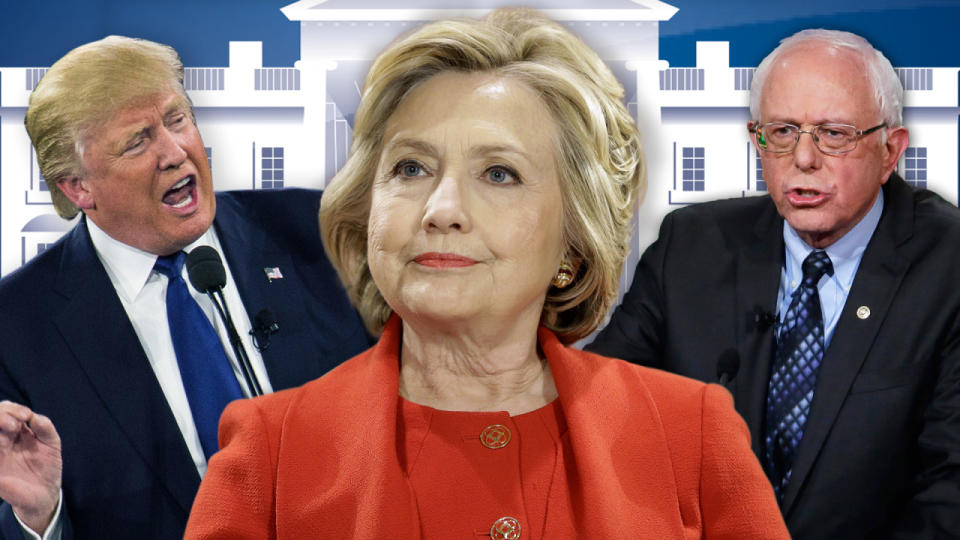
Donald Trump, Hillary Clinton and Bernie Sanders. (Photo illustration: Yahoo News; photos: AP)
On Tuesday night, Bernie Sanders defeated Hillary Clinton by more than 15 percentage points in West Virginia. He is favored to win upcoming contests in Oregon, Washington, Montana, New Mexico and South Dakota. He may even be competitive in California. And yet Sanders still trails Clinton by nearly 290 pledged delegates — an insurmountable margin in any realistic scenario .
Still, Sanders is continuing to campaign, insisting that he will catch up in the count and persuade the superdelegates to switch sides at the convention in Philadelphia. Yahoo News’ Liz Goodwin reports from Louisville, Ky., on the two-front war that Clinton is fighting as a result :
The former secretary of state has a near-lock on the Democratic nomination, but continues to lose states to Sanders, who hammers on her as a creature of Wall Street at his rallies that still draw thousands of supporters. Trump, meanwhile, now clear of any GOP rivals, has spent the past week directing all his considerable fire at her.
Trump’s called her “Crooked Hillary” and resurrected his attack against Bill Clinton’s past sexual relationships with women, painting Hillary as an “enabler” who wanted the women “destroyed.” At a rally in Washington Sunday, Trump said Hillary was playing the “woman card” to get support. “You know what? The women get it better than we do, folks. They get it better than we do. If she didn’t play that card, she has nothing,” he said.
Clinton gave several TV interviews the past week — more than usual for the candidate — and debuted her line of attack against Trump as a “loose cannon” who can’t be trusted with the nation’s security. She also rolled out a sweeping policy proposal in several stops in Kentucky on Tuesday, including a plan to provide federal grants and other assistance so that no family pays more than 10 percent of its income on childcare.
“Boy, do I think this presidential election has about the highest stakes that we’ve seen in a very long time,” she told a fired-up crowd in Louisville Tuesday evening.
Clinton didn’t mention Sanders. The campaign’s director of state and political engagement, Marlon Marshall, sent a fundraising email to supporters about the need to prepare for the general. The email included code visible to readers who received it on their phones. The coded message proclaimed, “Here comes the general.”
But the Clinton campaign has been sucked back into the Democratic primary all the same, spending nearly $200,000 on TV ads in Kentucky’s Democratic primary, which takes place next week. The ad buy is the campaign’s first since April 26, when Clinton swept several mid-Atlantic states and pivoted toward the general election. But Sanders refused to get on board with that plan. He won Indiana last Tuesday, and has vowed to continue to fight for every last vote in the primary, even threatening to contest the Democratic convention in July.
The campaign celebrated Clinton’s primary ad buys. “If you’re looking for a sign that the Clinton campaign knows this primary is far from finished, here it is,” Sanders campaign manager Jeff Weaver wrote in an email to supporters earlier Tuesday.
Sanders would need to win every remaining state by unprecedented margins to beat Clinton in the delegate race at this point, making his chance of winning the nomination remote. But his continued wins pull Clinton away from the general election, where Trump is focusing all of his energy.
Make sure to read the rest here.
_____
3. The Trump Veepwatch, Vol. 1: Newt Gingrich
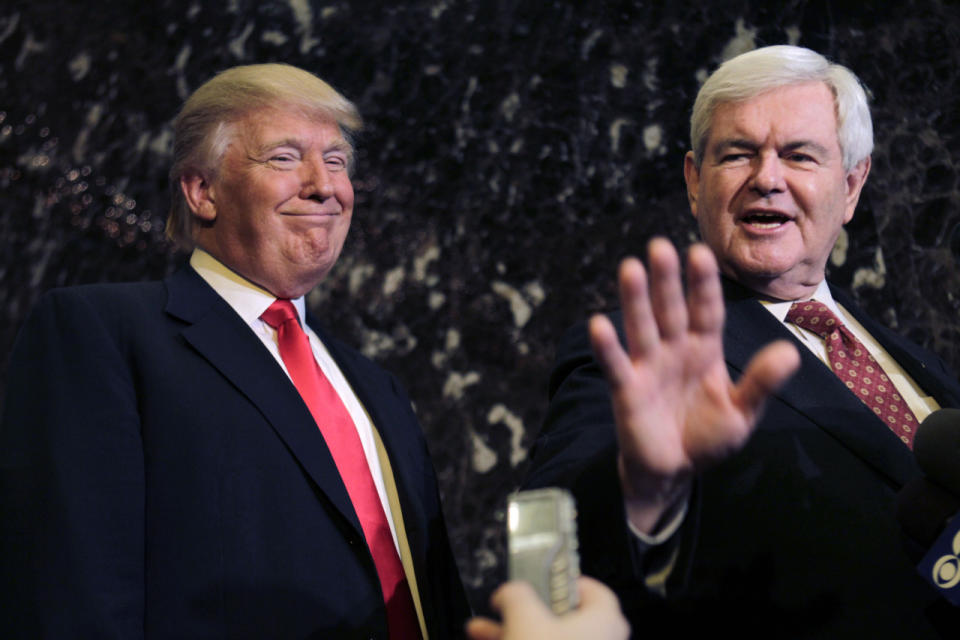
Donald Trump, left, smiles as Republican presidential candidate and former House Speaker Newt Gingrich talks to the media after their meeting in New York on Dec. 5, 2011. (Photo: Seth Wenig/AP)
In which Unconventional examines the presumptive Republican nominee’s possible — and not-so-possible — vice-presidential picks. The first in an ongoing series.
Name: Newton Leroy “Newt” Gingrich
Age: 72
Resume: Former Speaker of the U.S. House of Representatives (1995-1999); ten-term congressman from Georgia’s Sixth District, unsuccessful 2012 Republican presidential candidate and author or co-author of nearly 30 books.
Source of speculation: Gingrich himself. Asked late last month by the New York Times whether he would consider running alongside the tinsel-haired mogul from Manhattan, Gingrich dispensed with the usual dodges (“I do not intend to be anyone’s vice president at this time”) and openly embraced the idea of a Trump-Gingrich dream team.
“If a potential president says, ‘I need you,’ it would be very hard for a patriotic citizen to say no,” Gingrich gushed. “People can criticize a nominee, but ultimately there are very few examples of people turning down the vice presidency.”
(No doubt Newt considers himself “a patriotic citizen.”)
Trump allies, meanwhile, have echoed Gingrich’s enthusiasm for the pairing. “Newt has been enormously helpful defending Trump against the establishment,” longtime Trump consigliere Roger Stone recently told the National Review — adding that Gingrich “should be on Trump’s short list.”
“Newt is a revolutionary,” Stone said, “and Trump is leading a revolution.”
Backstory: Gingrich is nothing if not a shrewd self-promoter, and in retrospect it’s clear that he has spent the past several months auditioning to be Trump’s running mate (even as he strategically avoided endorsing any of the 2016 GOP candidates). In August, Gingrich declared that Trump “ is not like anyone else we’ve seen in politics .” In December, he said that a President Trump would be a “ big asset” for Republicans in Congress because he would “shatter traditional patterns.” In January, he wrote a fawning op-ed about Trump’s 1987 bestseller, “The Art of the Deal,” in which he described the book as a “remarkable” and “remarkably interesting” “classic” centered on “a remarkable set of rules and principles that allow [Trump] to make decisions with incredible speed.”
“Donald Trump is a genuine phenomenon,” Gingrich remarkably remarked.
On March 1, Gingrich predicted — correctly, as it turned out — that Trump would “tower over all of” his rivals on Super Tuesday. “The scale of his victories from Massachusetts and Vermont all the way across to Alaska is gonna be pretty stunning and, really for a guy who’s only been in politics for seven months, almost unimaginable,” Gingrich added.
“He is a man totally unique,” Gingrich continued later that week on FOX News. “He lives life at a 100 percent pace. I have never seen anything like it. If he becomes president, there is going to be a wall.”
Subsequent reports by the Daily Beast revealed that Gingrich had been quietly serving as an unofficial Trump adviser and conducting outreach to reluctant Washington Republicans on Trump’s behalf for some time.
“Newt has been on the Hill sharing his views on how Congress could work with a Trump administration,” said a Republican leadership aide. “Gingrich is trying to legitimize Trump while Mitt Romney and others are out there saying he’s terrible. Gingrich is saying that Trump’s positions are valid — he’s trying to add legitimacy to Trump while everyone else is doing the opposite.”
And in recent days, Gingrich has only intensified his efforts to legitimize Trump’s position as the new GOP standard-bearer.
“I think it’s a bit much,” Gingrich said after Mitt Romney, Paul Ryan, and Presidents George W. Bush and George H.W. Bush signaled that they would not be endorsing Trump, “for people who got to be president or got to be the nominee — because of the Republican Party — to now turn around and decide that they are smarter than millions and millions of Republican voters, and that they’re not going to be part of the team.”
Odds: Not bad, actually. On Tuesday, Trump told the Associated Press that he has already whittled his VP list down to “five or six people” — and we’d be surprised if Gingrich wasn’t one of them.
In the same interview, Trump revealed that he’s giving special weight to political experience, saying that he wants a vice president who can help him “with legislation” and “getting things through” Washington. As a result, Trump is mostly considering established politicians who have “been vetted over the last 20 years.”
“We don’t need another businessperson,“ Trump said.
Gingrich fits the bill. His speakership began almost exactly 20 years ago. He collaborated with President Bill Clinton to “get” several important “things” through Washington. As one of the most prominent Americans politicians of the 1990s — and as a 2012 presidential aspirant — he has been thoroughly vetted by the press and the public.
Gingrich’s strengths are, in many ways, Trump’s weaknesses; the two iconoclasts could complement each other nicely. Trump isn’t exactly detail-oriented; Gingrich has always billed himself as a policy wonk. Movement conservatives distrust Trump; Gingrich is a movement conservative. Trump doesn’t know much about legislating; Gingrich was a legislator for two decades. Trump has never waged a national political campaign against the Clintons; Gingrich has. (See: Contract with America, impeachment , etc.)
Of course there would be drawbacks to tapping Gingrich as well — drawbacks that would only exacerbate some of Trump’s biggest general-election handicaps. Like Trump, Gingrich is two-time divorcé now on his third marriage, and the unflattering details of his divorces — he reportedly negotiated with his first wife while she was in the hospital and asked his second wife to share him with his mistress — would do little to help Trump with skeptical woman voters. Trump, now nearly 70, would be the oldest president in U.S. history upon assuming office; Gingrich would be the oldest vice president. And Gingrich’s record — again, like Trump’s — would provide plenty of fodder for opposition researchers.
Still, we’re betting that Gingrich is a contender. In another interview, Trump described his ideal running mate as someone with “a strong political background, who was well respected on the Hill, who can help me with legislation.”
Sounds a lot like Newt.
What do you think? Would Gingrich make a good running mate for Trump? And which VP contender should we profile next? Drop us a line on Twitter (@andrewromano) and let us know.
_____
4. Where the Republican Party stands on Trump
Last week’s sudden collapse of Donald Trump’s primary foes has left a number of Republican leaders in a bind.
Trump waged a scorched-earth campaign to secure the nomination. He went to extreme lengths to belittle his rivals and the Republican establishment, deploying searing rhetoric while casting aside conservative policy orthodoxy.
Now the same party establishment scorned by Trump is trying to figure out what to do with him as its presumptive nominee. Some are refusing to offer their support.
This divide could redefine the convention in Cleveland, changing the character of the confab from a big commercial for the nominee — which is what is has been in the recent past — to a clash over the soul of the party.
Here’s Yahoo News’ exclusive accounting of where Republican leaders currently stand on Trump:
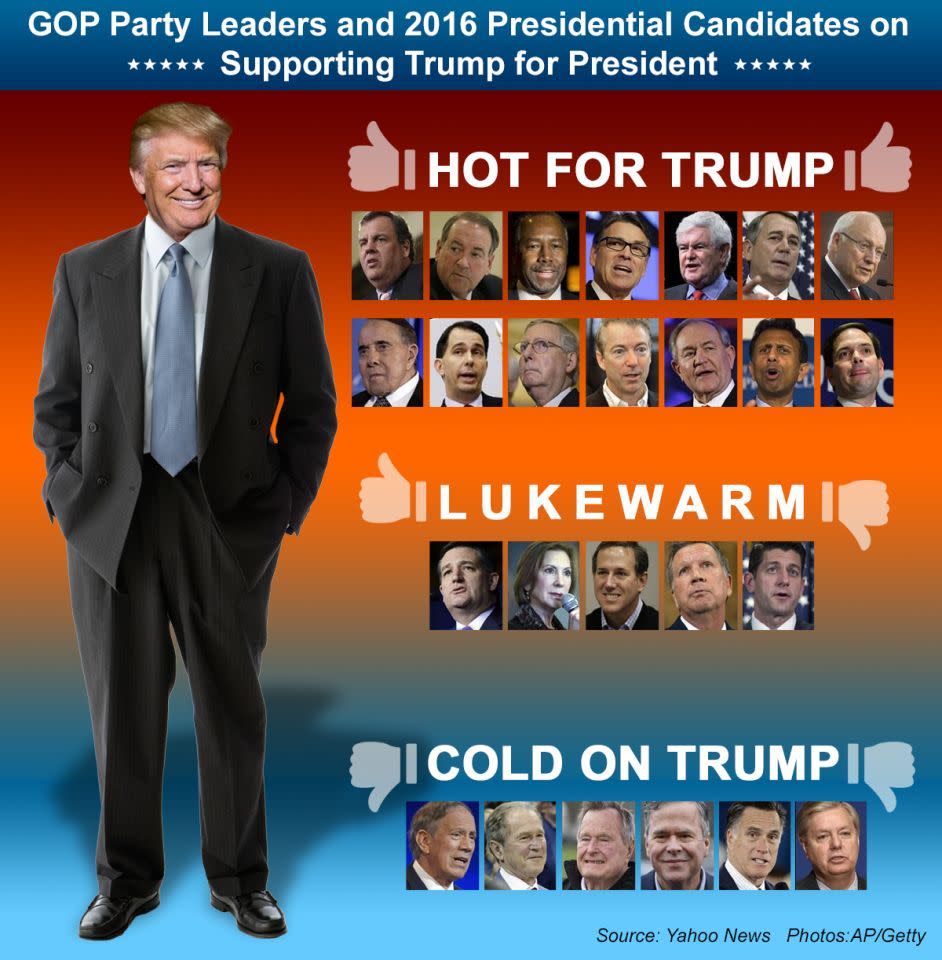
And here’s our breakdown of where the 54 GOP senators currently stand as well:
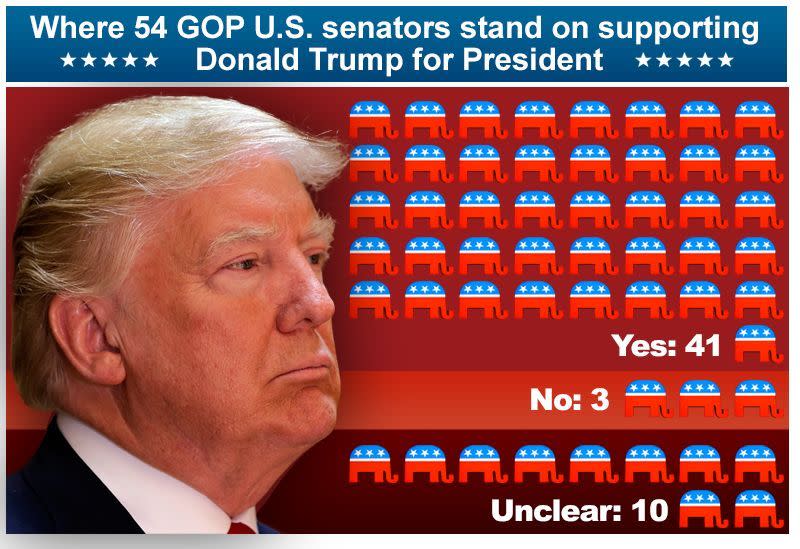
_____

5. The best of the rest
Trump eyes remaking convention w/showman’s touch. Looking for "a great singer, a great group” to break up speeches https://t.co/Ar0jOMImep
— Julie Pace (@jpaceDC)
NEW: Several top Trump aides will go to Cleveland this week to ensure convention extravaganza plans to their liking. https://t.co/okCtL9xMbE
— Jennifer Jacobs (@JenniferJJacobs)
Could an independent candidate succeed in 2016? https://t.co/q9U7M4OZ7v pic.twitter.com/p4JoXRbVQ5
— FiveThirtyEight (@FiveThirtyEight)
Scoop: RNC honchos Bruce Ash/Jim Bopp are launching a project aimed at safeguarding the party’s convention platform https://t.co/BD3QAeM8Wn
— Alex Isenstadt (@politicoalex)
MJS interview: Ryan would give up conv. chair if Trump asks, wants to get to know Trump better https://t.co/4lp4vLBfNF Priebus defends Ryan
— Craig Gilbert (@WisVoter)
Talked w/ @BernieSanders delegates repping at DNC in Philly in July. They’re scrambling for $5,000-7,000 to get here https://t.co/HiLFgJMKrM
— Brian X. McCrone (@BrianXMcCrone)
_____
Countdown
For the latest data, make sure to check the Yahoo News delegate scorecard and primary calendar .
(Cover tile photo: Carlos Barria/Reuters)




